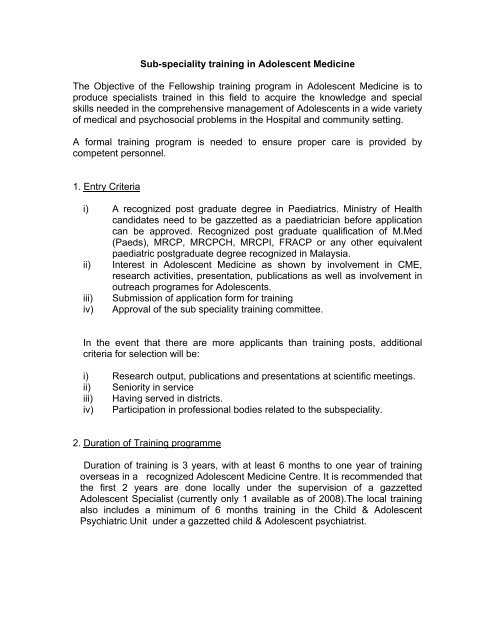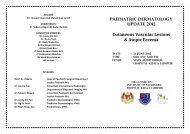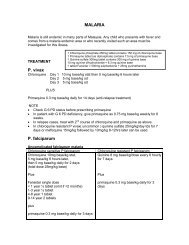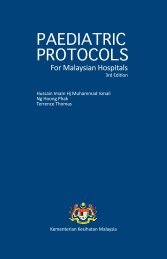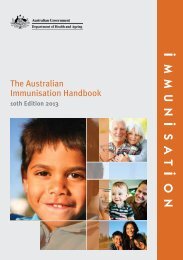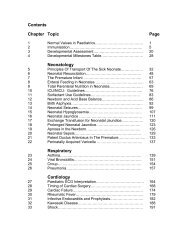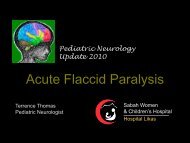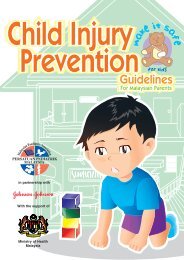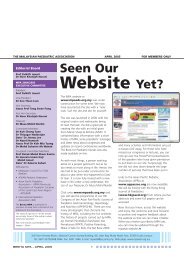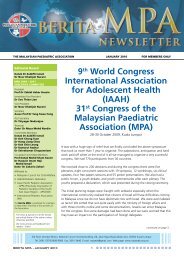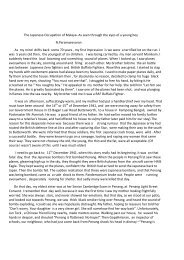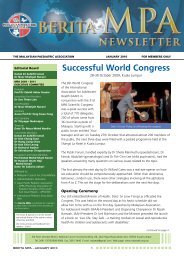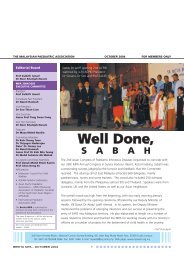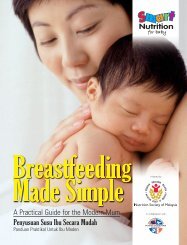(Adolescent Medicine)modified.pdf - Malaysian Paediatric Association
(Adolescent Medicine)modified.pdf - Malaysian Paediatric Association
(Adolescent Medicine)modified.pdf - Malaysian Paediatric Association
Create successful ePaper yourself
Turn your PDF publications into a flip-book with our unique Google optimized e-Paper software.
Sub-speciality training in <strong>Adolescent</strong> <strong>Medicine</strong><br />
The Objective of the Fellowship training program in <strong>Adolescent</strong> <strong>Medicine</strong> is to<br />
produce specialists trained in this field to acquire the knowledge and special<br />
skills needed in the comprehensive management of <strong>Adolescent</strong>s in a wide variety<br />
of medical and psychosocial problems in the Hospital and community setting.<br />
A formal training program is needed to ensure proper care is provided by<br />
competent personnel.<br />
1. Entry Criteria<br />
i) A recognized post graduate degree in <strong>Paediatric</strong>s. Ministry of Health<br />
candidates need to be gazzetted as a paediatrician before application<br />
can be approved. Recognized post graduate qualification of M.Med<br />
(Paeds), MRCP, MRCPCH, MRCPI, FRACP or any other equivalent<br />
paediatric postgraduate degree recognized in Malaysia.<br />
ii) Interest in <strong>Adolescent</strong> <strong>Medicine</strong> as shown by involvement in CME,<br />
research activities, presentation, publications as well as involvement in<br />
outreach programes for <strong>Adolescent</strong>s.<br />
iii) Submission of application form for training<br />
iv) Approval of the sub speciality training committee.<br />
In the event that there are more applicants than training posts, additional<br />
criteria for selection will be:<br />
i) Research output, publications and presentations at scientific meetings.<br />
ii) Seniority in service<br />
iii) Having served in districts.<br />
iv) Participation in professional bodies related to the subspeciality.<br />
2. Duration of Training programme<br />
Duration of training is 3 years, with at least 6 months to one year of training<br />
overseas in a recognized <strong>Adolescent</strong> <strong>Medicine</strong> Centre. It is recommended that<br />
the first 2 years are done locally under the supervision of a gazzetted<br />
<strong>Adolescent</strong> Specialist (currently only 1 available as of 2008).The local training<br />
also includes a minimum of 6 months training in the Child & <strong>Adolescent</strong><br />
Psychiatric Unit under a gazzetted child & <strong>Adolescent</strong> psychiatrist.
3.Training Programme<br />
3.1 Evidence of satisfactory training supported by:<br />
a) Log book<br />
b) Portfolio<br />
c) Satisfactory supervisors’ report<br />
3.2 Important Topics to be covered :<br />
• Familiarization with the normal developmental stages of an <strong>Adolescent</strong><br />
which includes:<br />
i) Interviewing techniques using the HEADDSS examination<br />
ii) Understanding the physical & Emotional changes at puberty<br />
iii) The clinical approach to an <strong>Adolescent</strong><br />
iv) The common medical and psychosocial challenges in<br />
Adolescence<br />
• Special <strong>Adolescent</strong> Issues and management :<br />
i) General Behavioural Issues like School refusal,<br />
bullying,gangsterism,substance abuse, smoking and violence<br />
ii) Sexual and reproductive Issues like sexual development and<br />
the abnormalities, sexual abuse, gender identity,Teenage<br />
pregnancy, Contraception, Pelvic Inflammatory Disease,<br />
Delayed puberty, precocious puberty, PCOS, ammenorrhoea<br />
etc<br />
iii) General medical conditions like chronic illness eg Diabetes,<br />
hypertension, Thallassemias, Asthma etc<br />
iv) Psychological Issues like suicidality, depression,Conduct<br />
disorders, Self harming tendencies, psychopharmacology.<br />
v) Eating Disorders-Anorexia Nervosa, Bullimia, EDNOS etc<br />
vi) Weight Management /obesity<br />
vii) Addiction medicine<br />
These topics are just some of the basic areas to be covered during the<br />
training and by no means is exhaustive.<br />
3.3 Methods of training<br />
Training will be done in the form of service provision (including clinics and on<br />
call duties)CME, seminars, journal sessions and case discussions.
3.4 Skills to be acquired<br />
The training will enable the candidate to acquire basic skills such as:<br />
i) Mastering basic changes in physical and psychosocial development<br />
ii) Enhancing their skills in engaging the young person<br />
iii) Developing strategies to engage the families using sound parental<br />
methods<br />
iv) Identifying risk factors and resilience of the young person<br />
v) Developing good practice of confidentiality to each patient.<br />
3.5 Performance of procedures / Activities<br />
The field of <strong>Adolescent</strong> <strong>Medicine</strong> does not have many specialized procedure.<br />
However a trainee is expected to have carried out some important<br />
procedures like:<br />
i) Conducting a PAP smear examination, High and low vaginal swab<br />
including proper preparation of slides<br />
ii) Preparation of slides from Urethral discharge and STI management<br />
iii) Administration of Depo Provera IM and the proper usage of<br />
contraception<br />
iv) Administration of Emergency contraception<br />
v) Advise on usage of condoms/diaphragm<br />
vi) Management of crisis in the OSCC<br />
vii) Attendance in court for medicolegal cases<br />
viii) Management of Post Exposure prophylaxis.<br />
3.6 Attendance and Presentation at professional meetings/courses<br />
This includes conferences related to the field, journal reads and family<br />
therapy sessions.<br />
3.7 Review and Evaluation process<br />
The learning experience of the trainee will be recorded in the log book which<br />
will include the information regarding cases seen and managed, special<br />
procedures done, outreach programmes involved, CMEs and presentations<br />
recorded. This also includes:<br />
i) Assessment of logbook periodically<br />
ii) Assessment of trainee’s attitude and commitment as stated in<br />
supervisors report at least 6 monthly
4. Training Centres and Trainers<br />
The approved criteria for a training centre will follow the basic requirement set<br />
by the the subspeciality committee. Some of this criteria include:<br />
i) Adequate number of patients for training, with both outpatient and<br />
inpatient services. There should at least be 100 new cases and at least<br />
200 follow up cases per year seen by the Unit. Centres with less the<br />
stipulated number may be considered on a case by case basis as<br />
decided by the sub speciality Committ.ee.<br />
ii) Training in the Psychiatry Unit should be under a gazzetted <strong>Adolescent</strong><br />
& Child Psychiatrist<br />
iii) The supervisor in <strong>Adolescent</strong> <strong>Medicine</strong> should be gazzetted and<br />
accredited as well as appointed by the sub speciality committee.<br />
iv) The ratio of trainer to trainee should not be more than 2 at any point of<br />
time.However this is also determined by the workload of the unit.<br />
v) Overseas training should be for a minimum of at least 6 months. The<br />
overseas centre should be also an accreditated one with gazzetted<br />
trainers.<br />
5. Outreach Programmes<br />
The training in <strong>Adolescent</strong> <strong>Medicine</strong> should include at least 1 outreach<br />
programme. This can include sessions at the Family Planning Unit (LPPKN),<br />
Half way homes for <strong>Adolescent</strong>s, Juvenile Centres etc. for a period of time<br />
locally or overseas.
6.Criteria for Accreditation of <strong>Adolescent</strong> <strong>Medicine</strong> Specialist in Malaysia<br />
A) Any doctor can request to be registered if he/she fulfils ALL the following<br />
requirements:<br />
i) A basic medical degree recognized by the <strong>Malaysian</strong> Medical<br />
Council<br />
ii) A recognized post graduate qualification recognized by the<br />
<strong>Malaysian</strong> <strong>Paediatric</strong> Speciality Board ie {M.Med (Paed),<br />
MRCP,MRCPCH,MRCPI,FRACP or any other degrees equivalent}.<br />
B) Completed postgraduate <strong>Adolescent</strong> <strong>Medicine</strong> training in recognized<br />
centres<br />
i) A minimum of 3 years of local and overseas training under the<br />
supervision of a clinical <strong>Adolescent</strong> Specialist<br />
ii) The candidate must furnish evidence of satisfactory clinical attachment<br />
in the training centre such as:<br />
• Portfolio with supporting documents, certificate of completion,<br />
certificate of attendance to courses etc<br />
• Log book of patients seen<br />
• Satisfactory supervisors report<br />
C) Grandmother clause<br />
i) Senior peadiatricians may be credentialed if they had at least I year<br />
attachment at a credentialed <strong>Adolescent</strong> <strong>Medicine</strong> Unit overseas and have<br />
been working with <strong>Adolescent</strong>s specifically in the field of <strong>Adolescent</strong><br />
<strong>Medicine</strong> for at least 2 years.<br />
ii) Candidates/ <strong>Paediatric</strong>ians who have recognized qualification from<br />
<strong>Adolescent</strong> <strong>Medicine</strong> Unit overseas with reports from these centers.
Checklist and criteria for Accreditation of centre for <strong>Adolescent</strong> <strong>Medicine</strong><br />
Name of Candidate: ______________________________________<br />
A. Clinical <strong>Adolescent</strong> work load<br />
i) No of new consultations a year _______________per year<br />
(Min 100/year)<br />
ii) No of follow up cases seen in a year ________________per year<br />
( Min 200/year)<br />
iii) Provides Laboratory and support services Yes { } No { }<br />
iv) Provides follow up care Yes { } No { }<br />
B. Training facilities for <strong>Adolescent</strong> <strong>Medicine</strong><br />
i) Total number of accreditated clinical <strong>Adolescent</strong> Specialist ___________<br />
( At least 1)<br />
ii) Satisfactory Outpatient Clinic rooms with conducive interview room for<br />
patient and family Yes { } No { }<br />
iii) Availability of computers/ internet access Yes { } No { }<br />
C. Clinical activities in <strong>Adolescent</strong> <strong>Medicine</strong><br />
i) Ward rounds with <strong>Adolescent</strong> Specialist/week __________<br />
( min 1per week)<br />
ii) Attachment with other units eg psychiatry unit/week____________<br />
( min 1 in 2 months)
iii) Participation in departmental CMEs Yes { } No { }<br />
iv) Conferences/Workshops attended per year _________( min 2 /year)<br />
D. Log Book.<br />
Please attach the list of cases seen and their diagnosis.
LOG BOOK<br />
As the field of <strong>Adolescent</strong> <strong>Medicine</strong> is mostly dealing with behavioural issues,<br />
there are basic clinical situations that need to be managed during the training.<br />
The list is not exhaustive list but a minimum requirement:<br />
1. General <strong>Adolescent</strong> Issues<br />
Mastering HEADDSS examination<br />
School refusal<br />
Learning disorders /Mental<br />
Retardation<br />
ADHD<br />
Cognitive /Social development<br />
AffectiveDevolopment<br />
(early/mid/late adolescent)<br />
Compliance issues<br />
Family problems<br />
Bereavement/ Death<br />
Physical Abuse<br />
Smoking/Bullying /Violence<br />
(Tick √ )
2. Sexual and Reproductive Issues<br />
Normal Pubertal changes<br />
Breast examination/ Gynocomastia<br />
Urethritis/Vaginitis<br />
STI<br />
Sexual exploitation/Abuse/Rape<br />
Teenage pregnancy<br />
Contraception<br />
Gender Identity/Homosexuality<br />
Sodomy<br />
Pelvic Inflammatory Disease<br />
DUB/Ammenorhoea/Dysmenorrhoea<br />
Delayed/precocious puberty<br />
PCOS/Hirsutism<br />
Sexuality/Sex education<br />
Screening for STI<br />
HIV/ Genital ulcers
3. Chronic illness<br />
Compliance issues in chronic illness<br />
Psychological adaptation<br />
Thallasemias/Malignancies<br />
Renal<br />
Asthma/ chronic resp conditions<br />
CVS<br />
GIT-Abdominal pain/Chrohns/UC<br />
Chronic neurological conditions<br />
Connective Tissues/Bone<br />
Diabetes/Endocrine<br />
4. Eating Disorders and Weight Management<br />
Anorexia Nervosa<br />
Bullimia<br />
Food Avoidance<br />
EDNOS
Disordered Eating<br />
Overweight/Obesity/OSAS<br />
Insulin Resistance<br />
5. Psychological problems<br />
Depression/ Dysthymia<br />
Anxiety disorders<br />
Conduct Disorders<br />
Personality disorders<br />
Obsessive/ Compulsive Disorders<br />
Conversion<br />
Autism/Pervasive disorders<br />
Suicide<br />
Self harming/Mutilating<br />
Psychosis<br />
Mood disorders<br />
Phobias/Fears<br />
PTSD<br />
Psychopharmacology<br />
Bereavement counseling<br />
Addiction
7. Special procedures /Outreach / Activities<br />
PAPs smear/slide preparation<br />
Low & High vaginal swabs<br />
IM DEPO PROVERA<br />
Court Attendance<br />
Outreach programmes-LPPKN/<br />
Juvenile centres etc<br />
Half way homes for teens<br />
Prepared by :<br />
Dr Sheila Marimuthu<br />
Consultant <strong>Paediatric</strong>ian & <strong>Adolescent</strong> Specialist<br />
<strong>Adolescent</strong> <strong>Medicine</strong> Unit<br />
Hospital Kuala Lumpur<br />
(Last reviewed May 2008)


